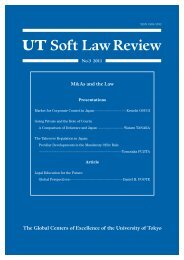UT Soft Law Review
UT Soft Law Review
UT Soft Law Review
Create successful ePaper yourself
Turn your PDF publications into a flip-book with our unique Google optimized e-Paper software.
<strong>UT</strong> <strong>Soft</strong> <strong>Law</strong> <strong>Review</strong> No.2 2010proposal would change the corporation’s governance system so that no director candidatewould be elected or re-elected without receiving a majority of the votes represented in personor by proxy at the annual shareholders meeting. That would increase the influence ofinstitutional shareholders, which often collectively control enough shares to constitute—orblock—a majority vote. The institutional pressures to effect that change led many publiccorporations to agree voluntarily to amend their certificates to provide for majority voting. In2006, in response to this movement, the Delaware legislature amended the DGCL to permitDelaware corporations to adopt majority voting either by certificate or by-law amendment. 38Other forms of institutional investor by-law proposals would increase shareholder accessto the corporate ballot by reducing the cost (to dissident shareholders) of waging a proxycontest. One variation would enable certain shareholders, under specified circumstances, touse the corporation’s proxy materials to nominate an opposing slate of director candidates. Asecond variation would require the corporation to reimburse the dissidents’ reasonableexpenses of conducting a proxy contest where the dissident slate wins at least a minority ofthe board positions. Such a proposal was the subject of a recent decision by the Justices ofthe Delaware Supreme Court, who held that such a by-law could be adopted by shareholdervote without the board’s consent. 39Viewed from a broader perspective, these efforts by shareholders to “push back” thepower of boards to control the takeover process are part of a more pervasive movementtaking place in the European Union, the U.K., and Australia, to shift the focus of corporatelaw from protecting the interests of shareholders, affirmatively to grant shareholders greaterparticipatory rights in the corporate governance process. 40 Although these developments donot affect Delaware’s anti-takeover jurisprudence in any direct way, they will likely influencehow that jurisprudence continues to evolve.D. State Anti-Takeover LegislationAt the risk of complicating further an already-complex institutional tapestry, the story ofhow the anti-takeover institutional framework evolved in the United States would beincomplete without one final piece. I refer to the enactment, by several states, of differentforms of anti-takeover legislation that vary markedly from the court-centered Delawaresystem I have described. That state anti-takeover legislation falls into two categories: (i)statutes designed to regulate the substance of corporate takeovers, or some aspect thereof,and (ii) statutes intended to afford target company directors greater latitude in blocking38 8 Del. C. § 216.39 CA, Inc. v. AFSCME Employees Pension Plan, 953 A.2d 227 (Del. 2008) (validating shareholder powerto enact proposed by-law but holding that by-law could not be worded so as to preclude the board fromexercising its fiduciary duty to deny reimbursement in an appropriate case).40 See, Jennifer G. Hill, regulatory show and tell; lessons from international statutory regimes 33 Del. J.Corp. L. 819 (2008); 2007 EU directive on Shareholder Rights, Euro. Comm, modernisation of company l awand enhancement of corporate governance, http://ec.europa.eu/internal_market/company/modern/ index_en.htm.23





